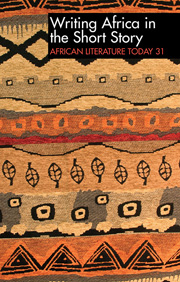Book contents
- Frontmatter
- Dedication: Chinua Achebe Joins the Ancestors
- Stop Press/ Tribute to Kofi Awoonor 1935–2013
- Contents
- Notes on Contributors
- Editorial Article
- Articles
- “Real Africa”/“Which Africa?”: The Critique of Mimetic Realism in Chimamanda Ngozi Adichie's Short Fiction
- Writing Apartheid: Miriam Tlali's Soweto Stories
- Articulations of Home & Muslim Indentity in the Short Stories of Leila Aboulela
- Ugandan Women in Contest with Reality: Mary K. Okurutu's A Women's Voice & the Women's Future
- Snapshots of the Botswana Nation: Bessie Head's The Collector of Treasures & Other Botswana Village Tales as a National Project
- Widowhood – Institutionalized Dead Weight to Personal Identity & Dignity: A Reading of Ifeoma Okoye's The Trial & Other Stories
- Feminist Censure of Marriage in Islamic Societies: A Thematic Analysis of Alifa Rifaat's Short Stories
- Diaspora Identities in Short Fiction by Chimamanda Ngozi Adichie & Sefi Atta
- Exposition of Apartheid South African Violence & Injustice in Alex la Guma's Short Stories
- Locating a Genre: Is Zimbabwe a Short Story Country?
- Mohammed Dib's Short Stories on the Memory of Algeria
- Ama Ata Aidoo's Short Stories: Empowering the African Girl-Child
- Ama Ata Aidoo: an Interview for ALT
- Reviews
“Real Africa”/“Which Africa?”: The Critique of Mimetic Realism in Chimamanda Ngozi Adichie's Short Fiction
from Articles
Published online by Cambridge University Press: 05 December 2013
- Frontmatter
- Dedication: Chinua Achebe Joins the Ancestors
- Stop Press/ Tribute to Kofi Awoonor 1935–2013
- Contents
- Notes on Contributors
- Editorial Article
- Articles
- “Real Africa”/“Which Africa?”: The Critique of Mimetic Realism in Chimamanda Ngozi Adichie's Short Fiction
- Writing Apartheid: Miriam Tlali's Soweto Stories
- Articulations of Home & Muslim Indentity in the Short Stories of Leila Aboulela
- Ugandan Women in Contest with Reality: Mary K. Okurutu's A Women's Voice & the Women's Future
- Snapshots of the Botswana Nation: Bessie Head's The Collector of Treasures & Other Botswana Village Tales as a National Project
- Widowhood – Institutionalized Dead Weight to Personal Identity & Dignity: A Reading of Ifeoma Okoye's The Trial & Other Stories
- Feminist Censure of Marriage in Islamic Societies: A Thematic Analysis of Alifa Rifaat's Short Stories
- Diaspora Identities in Short Fiction by Chimamanda Ngozi Adichie & Sefi Atta
- Exposition of Apartheid South African Violence & Injustice in Alex la Guma's Short Stories
- Locating a Genre: Is Zimbabwe a Short Story Country?
- Mohammed Dib's Short Stories on the Memory of Algeria
- Ama Ata Aidoo's Short Stories: Empowering the African Girl-Child
- Ama Ata Aidoo: an Interview for ALT
- Reviews
Summary
People are expecting from literature serious comment on their lives. They are not expecting frivolity. They are expecting literature to say something important to help them in their struggle with life. That is what literature, what art, was supposed to do: to give us a second handle on reality so that when it becomes necessary to do so, we can turn to art and find a way out. So it is a serious matter. That's what I'm saying, and I think every African writer you talk to will say something approaching what I have just said — in different forms of words, except those who have too much of the West in them, and there are some people, of course, who are that way But the writer I am referring to is the real and serious African writer. I think you will find them saying something which sounds as serious, as austere, or as earnest as what I have just said.
(Chinua Achebe in Rowell 1990: 88)A great deal of postcolonial literary criticism about African literature naturalizes the notion that African writers produce literary artwork whose primary function is the exposure of the atrocities of the colonial era — and the lingering effects of that era — in order to redress injustice via a true account of history. The idea is that, once people know this true story of their own history, they shall be more able to resist the psychological and sociocultural effects of imperialism and its attendant racist dogma. In the words of the epigram above, the ‘serious’, ‘austere’, ‘earnest’, and above all the ‘real’ African writer, who does not ‘have too much of the West’ in her, meets the ‘expectations’ of ‘the people’ by producing literature that has a positive, direct, material impact on the lives of African readers.
- Type
- Chapter
- Information
- Writing Africa in the Short Story , pp. 8 - 24Publisher: Boydell & BrewerPrint publication year: 2013



